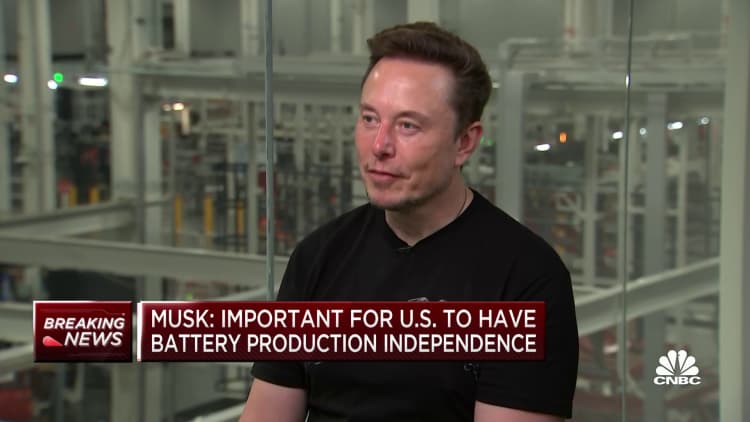
Elon Musk spoke this week on a topic few CEOs want to weigh in on publicly: China's intentions to ultimately integrate Taiwan as part of the People's Republic of China.
"The official policy of China is that Taiwan should be integrated. One does not need to read between the lines. One can simply read the lines," Musk said in an interview with CNBC's David Faber. "There's a certain inevitability to the situation."
Musk, whose EV company Tesla has a major factory in China, said China and the rest of the global economy are like "conjoined twins" and any future attempts to separate them will have severe consequences. And he added, "the situation is actually a lot worse for a lot of other companies than Tesla. I'm not sure where you will get an iPhone."
Apple is taking steps to de-risk its supply chain from China, most notably through its recent efforts to increase manufacturing in India and in the U.S., including iPhone parts in India and chips in conjunction with Taiwan Semiconductor Manufacturing Company in the U.S. Warren Buffett recently told Japanese news agency Nikkei Asia that a decision to sell most of the $4 billion in shares of TSMC his Berkshire Hathaway had amassed just last year was made with geopolitical tensions being "a consideration."
Dewardric McNeal, a China expert and senior policy analyst at strategic consulting firm Longview Global, says this is an issue that many more companies need to be taking seriously.
McNeal, a CNBC contributor who spoke at last year's CNBC CFO Council Summit on China's increasingly authoritarian regime under Xi Zinping — who has been warning for some time that the market needs to be taking China more seriously as a risk management issue — said in a CNBC interview after Musk's comments that he agreed there should be "a set of built-in assumptions" about the potential outcomes for Taiwan's future.
There should be no doubt that China' policy and intent is to integrate Taiwan into the People's Republic of China, and McNeal said its capabilities are growing to do that, as is its national level of confidence to do it. But he added that China is not the only actor with influence over the situation, which includes the U.S. and Taiwan and its allies, as well as multinational corporations. McNeal says the message that corporate leaders should take away from Musk speaking up about Taiwan is that even if they won't speak out as political actors, they should at least be speaking clearly about the potential risks to their businesses, and their own intentions for business relationships in China, and planning mitigation strategies now.
"Global corporations have a say here and it is time for people to speak more clearly like Elon about the potential outcomes and make it clear they are uncomfortable, and start to vote with your feet," he said.
That means de-risking supply chains to decrease dependence on China and make it clear that the heightened geopolitical tensions and threat to Taiwan are a concern, he added.
But McNeal stressed that his view remains that China won't act anytime soon. "I don't think it's imminent but I do think companies should heed what he [Musk] says."
The U.S. government policy remains to not take an official position on Taiwan as an independent and sovereign state. McNeal said China still has "too many problems at home to deal with," and isn't sure it can win in a military invasion scenario now. But companies and their investors can't procrastinate.
"By that I mean don't navel gaze ... whistle past the graveyard," McNeal said, adding that China's strategies to assert more control over Taiwan are not limited to invasion.
"If I'm on the board of a company with exposure or I am an investor, I am going to start to press on what the plan is to de-risk," he said. "Use this time between now and when a scenario may be one China could execute on, to plan and get prepared. I would not sit back and wait."
The business world was given a preview of the "conjoined nature" of the global economy when the Trump and Biden administrations began a crackdown on China's technology sector and access to key U.S. tech. During the chip shortages of Covid, McNeal told CNBC of the tech cold war, "what frightens me the most is the geopolitical ... the politics of this is just getting starting in Washington and Beijing," he said. "I don't know if industry is quite prepared to really understand how bad it is going to get between Washington and Beijing."
More recently, when Russia invaded Ukraine, the market was given a preview of all of the broader possibilities, from the extreme military side to the economic sanctions and export controls on the other side. And McNeal said Russia-Ukraine is "the base case" to analyze, but he added, "this is nothing compared to if China were to invade Taiwan or there were economic sanctions against China. It's a complex scenario but businesses need to start now," he said. "To me it means use this time to figure out how to untie this Gordion Knot."







